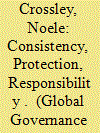| Srl | Item |
| 1 |
ID:
174655


|
|
|
|
|
| Summary/Abstract |
Selective humanitarianism, it has been argued, may be condonable, or even preferable. Several arguments have been proffered in support of these views. This article revisits these arguments in light of the emergence of a discourse of protection and responsibility that now incorporates a wider spectrum of protection measures available to agents, of which armed intervention is but one. Consistency is an essential characteristic of ethics and the law—inconsistent practice diminishes the prospects of the development of norms of protection and associated practices and institutions. Furthermore, inconsistent practice means that fewer people receive protection from egregious violations of human rights. If the principles associated with human protection and humanitarianism are to become established norms of international society, international policy must be coherent, and international practice must be consistent.
|
|
|
|
|
|
|
|
|
|
|
|
|
|
|
|
| 2 |
ID:
158659


|
|
|
|
|
| Summary/Abstract |
The Chinese Communist Party faces a dilemma in local community governance, i.e. state intervention vs. community self-governance. Increased intervention violates its long-promoted social self-governance and undermines the regimes’ credibility and legitimacy, while less intervention may add to the risk of social instability and collective actions at the local level. Therefore, selective intervention is applied by local government as a rational choice in community governance. This article explores the political rationale of local governments’ selective intervention in community disputes in urban China. The authors argue that the type of community, the degree of homeowners’ solidarity and the media exposure significantly affect the likelihood and degree of a local state’s intervention as well as the local government’s response in the dispute resolution.
|
|
|
|
|
|
|
|
|
|
|
|
|
|
|
|